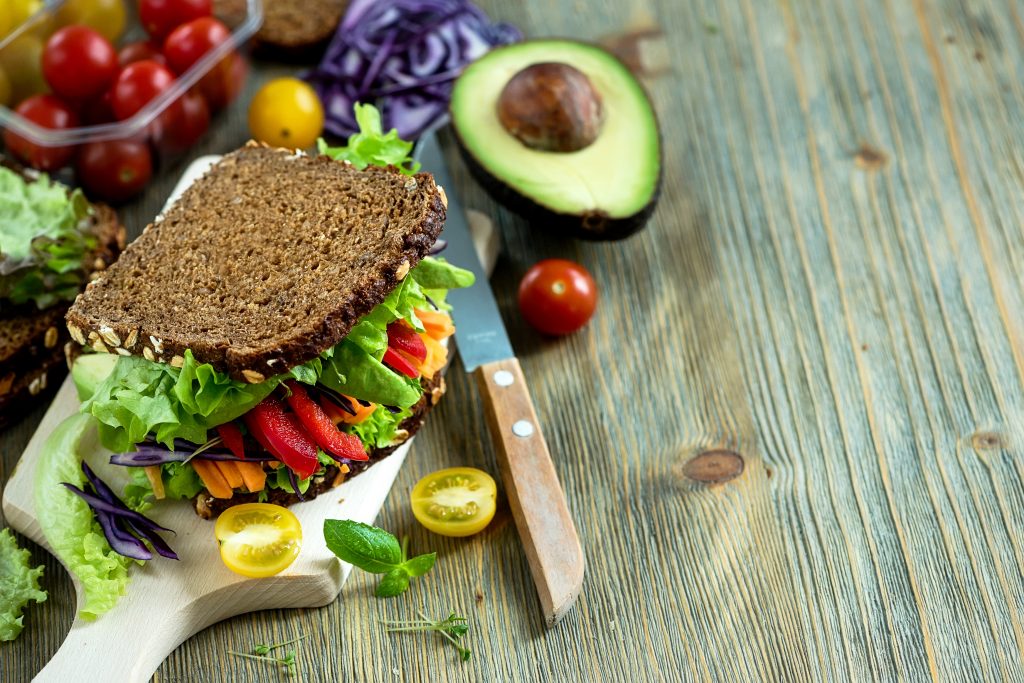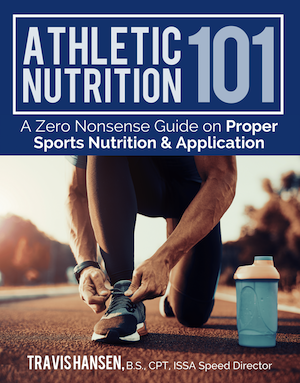Humans are very tribal, and especially so when it comes to their nutritional preferences: Paleo vs. Keto vs. Vegan vs. Jets vs. Sharks vs. Decepticons.
It’s crazy out there.
In lieu of the release of his new book, Athletic Nutrition 101, regular TG.com contributor, Travis Hansen, sent me this fantastic blog post the other day I think you all will enjoy.

Does Vegan Nutrition Make You a Better Athlete?
Before we dive in I want to make it clear that my sole intention with writing this objective article is to just be, you know…objective.
There is no denying that there are some profound emotional ties with various types of diets and nutritional approaches and although the information and science presented may trigger or ruffle up some feathers, please understand that is not my intent at all.
The purpose of this write-up is to simply look at some of the brief scientific literature as it pertains to proper vegan nutrition and its role on athletic performance outcomes to either confirm or disprove its credibility as a reliable dietary strategy for athletes.
That’s it.
I think it’s best to start by breaking down specific topics of discussion aimed at providing a conclusion into whether or not utilizing a vegan approach could support you or an athlete you train into becoming a better performer on the field or court.
Here are the most common areas of concern as far as the research is concerned on vegan nutrition and performance:
- #1-Supplementation factors-Vitamin B12 deficiency
- #2-Adequate protein intake
- #3-Iron and Creatine levels
Supplementation Factors
Vitamins and Minerals are absolutely critical to so many biochemical reactions and functions in the human body.
Vitamins are stimulatory in nature and satisfy specific roles responsible for improved athletic performance measures, or a lack thereof. According to one study, supra or mega-doses of vitamins does not seem to have any increased benefit on sport performance.
“In general, vitamin supplementation to an athlete on a well-balanced diet has not been shown to improve performance. However, additional research with certain vitamins appears to be warranted, such as with the vitamin B complex and fine motor control, and with vitamin E and endurance at high altitudes. Moreover, research with mega-dose supplementation may also be necessary.” (1)
Unfortunately, there is some concern regarding a vegan approach and whether or not it can deliver proper doses of Vitamin B12 without supplementation.
“On the other hand, questions have been raised by some investigators regarding unique risks of the vegetarian diet, including oligomenorrhea and amenorrhea, iron deficiency, vitamin B12 deficiency, vitamin D deficiency, and impaired mineral status.” (2,3)
However, if athletes remove deficiencies and restore normal Vitamin B12 levels then there doesn’t seem to be an issue in terms of performance.
Adequate Protein Intake
The next issue deals with protein intake. This topic definitely seems to be the most detailed and alarming, but again, if
athletes supplement and consume adequate amounts of vegan protein sources they should be just fine.
Here is a short excerpt from my nutrition book that puts it into perspective and then afterwards I want to share some important information and a diagram you can check out from the infamous Boirie study which will help you appreciate why you need to attempt to overcompensate and consume more protein than normal to ensure an adequate anabolic muscle building response in the body.
“Adequate protein intake, although more perhaps difficult to come by for vegans vs. non vegans, does seem attainable to support proper athletic development.
For example, a study from van Vliet, 2015 found that plant protein is typically less anabolic than animal protein for several reasons. 132
Some include a reduced amount of essential amino acids, in particular Leucine. Greater excretion rates, proposed digestibility issues and more. However, the author did state that several strategies could be used to improve the anabolic response of a protein based meal primarily derived from plants. Including a higher variety of plant based protein sources, supplementing the amino acids leucine, lysine, and methionine, and eating greater amounts of plant based protein sources. Gorissen et. al agrees that compensating for reduced functional protein content by eating higher quantities of plant based protein is one way to go.133 “
So, the research clearly states that it is possible to ingest enough protein if you are a vegan, but you need to be particularly aware of the types of protein that you are consuming with a strong emphasis on getting in more than normal to overcompensate for any issues in amino acid content, increased removal of this type of protein, and digestive issues associated with vegan protein sources.
The amino acid Leucine is a key regulator in muscle growth via the MTOR pathway and lowered levels of this Branched Chain Amino Acid will cause reduced muscle growth levels, so you may need to supplement here if you are electing to be vegan.
Another issue that was brought to attention compliments of leading researcher Lyle Mcdonald, is the extremely poor digestion rate of vegan based protein sources.
According to the Boirie study chart, our digestive network has an absorption rate of 3.9 grams of Soy Isolate based protein per hour!
This is insanely low compared to meat based sources.
The unfortunate reality is that protein digestion rates are markedly slow to begin with and Soy based products compound this issue and make it even more difficult. Not to mention you have to be very concise with your vegan protein food combing selections if you aren’t consuming a vegan based protein supplement.
Here is another helpful excerpt from my book:
“Let’s first take a look at a limiting factor with regards to vegan based protein sources, comparative to animal based proteins dense with complete protein. When we eat meat, eggs, and other animal sources of protein then there is no need to fret about fulfilling a complete amino acid profile. Plant based sources, on the other hand, lack one essential amino acid and need to be complemented by another source to deliver all amino acids.
For example, plant based protein sources are often guilty of being unable to deliver a single amino acid known as the ‘limiting amino acid.’
“For example, grains’ limiting amino acid is lysine, but grains are high in the amino acid methionine. Therefore, grains match well with legumes, which are low in methionine but high in lysine.”
So greater consumption of complimentary proteins becomes essential to make sure that all potential deficiencies are accounted for, while also giving some extra supply of amino acid’s since plant based proteins are only 85% digestible, compare to animal sources which scale around 95%.” 2
And here are some combination strategies if you are going down the vegan path of nutrition to ensure you get a complete arsenal of amino acids to build all of your proteins….
Plant Based Meal Combo’s:
- Stir fried vegetables and tofu over rice (soy and grains)
- Vegetable chili with cornbread (legumes and grains)
- Oatmeal with nuts and soy milk (grains, nuts, and soy)
- Spinach salad with vegetables, garbanzo beans, and sunflower seeds (legumes and seeds)
Iron & Creatine Levels
The final concern for vegans trying to optimize their nutrition and athletic development deals with keeping Creatine and Iron levels.
As many of you already know, Creatine phosphate is the primary metabolic driver for literally any activity performed at or very near maximal intensities, and Iron is critical to any aerobic based activity.
But what about the upside to a vegan approach on performance?
This wasn’t directly mentioned in the research, but upon observation it’s obvious that vegan based diets contain higher levels of carbohydrates. This topic is another article series in itself, but if you are interested in how and why carbohydrates are essential for ANY athlete looking to perform better, here is a quick primer series below, and my book goes into even more detail if you are interested.
Vegan diets do a great job of prescribing the proper amounts and types of carbohydrates which many other nutritional approaches lack, so kudos to Vegans on this front!
1. 5 Scientific Reasons to Eat Carbs – HERE
2. 5 More Scientific Reasons to Eat Carbs – HERE
3. Even More Reasons Why Athletes Should Eat Carbs – HERE
Final Thoughts
In closing, there is no magic cure for nutrition for any athlete.
Rather there is a broad range of diets you can experiment with and see how you and your performance responds.
A vegan approach, although more difficult for the few reasons I mentioned above, does seem to work, contrary to what many people say. Also keep in mind that there are indeed absolutes that need to be considered when it comes to nutrition, and once you begin to learn and understand these timeless principles it will make you and your athletes life much easier.
For example, overall energy intake regulates so much of our metabolic system and needs to be set at certain levels for proper functioning. Researchers have dialed down precisely how much protein our body’s can assimilate per meal and per day along with governors in our body that have been developed in the liver and through fullness responses. There are different ways to go about nutrition and some subtle differences between individuals, but then again there seems to be FAR more similarities and that helps simplify the topic to a high degree.
Athletic Nutrition 101

To pick up a copy of Travis’ book, which is priced at a steal given the amount of information he provides and the depth at which he goes into, you can go HERE.
Scientific References
#1-Williams, MH. Vitamin Supplementation and Athletic Performance. Int J Vitam Nutr Res Suppl, 30: 163-191, 1989.
#2-Barr, Susan I, and Candice A Rideout. “Nutritional Considerations for Vegetarian Athletes.”Nutrition, vol. 20, no. 7-8, 2004, pp. 696–703., doi:10.1016/j.nut.2004.04.015.
#3- https://link.springer.com/article/10.1007/s12534-009-0017-y
#4- https://bodyrecomposition.com/nutrition/what-are-good-sources-of-protein-speed-of-digestion-part-2.html/



